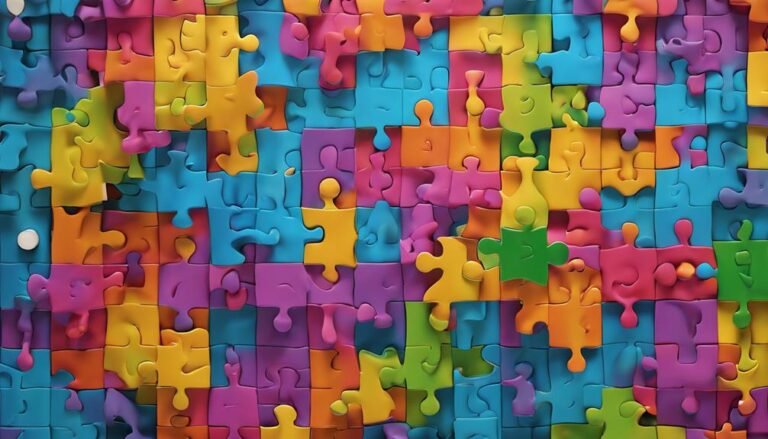Freud’s Stages of Psychosexual Development
Embark on a journey through Freud's Stages of Psychosexual Development, where the exploration of childhood experiences sculpt the complexities of adult personalities. From the innocence of the oral stage to the complexities of the genital stage, each phase symbolizes a critical juncture in the formation of one's psychological landscape. As you delve into the intricacies of libido development, erogenous zones, and the Oedipus Complex, you'll uncover a profound understanding of how early encounters shape the intricacies of human relationships and emotional growth.
Key Takeaways
- Oral Stage involves pleasure through sucking and feeding habits.
- Anal Stage shapes personality through positive or harsh toilet training.
- Phallic Stage includes Oedipus Complex and desire for opposite-sex parent.
- Latency Stage focuses on social and intellectual skills development.
- Genital Stage marks mature sexual relationships and intimate connections.
Oral Stage
During the Oral Stage of Freud's Stages of Psychosexual Development, infants derive pleasure primarily through the act of sucking and exploring the world through their mouths. This stage typically occurs from birth to around 18 months. During this phase, feeding habits play an essential role in the infant's development. The weaning process, in particular, is significant as it marks the shift from breastfeeding or bottle-feeding to solid foods. The way in which this process is handled can impact the individual's future relationships and behaviors.
Moreover, the Oral Stage is associated with the concept of oral fixation. Individuals fixated at this stage may exhibit behaviors such as nail-biting, thumb-sucking, or smoking in later life. They might also resort to self-soothing techniques involving oral activities. Understanding these patterns can provide insights into one's coping mechanisms and potential areas for personal growth.
Anal Stage
You'll now explore the Anal Stage of Freud's psychosexual development theory, focusing on the impact of toilet training and the development of anal retentive traits.
This stage is essential in understanding how early experiences during toilet training can shape an individual's personality and behavior later in life.
Toilet Training Effects
At the Anal Stage of Freud's psychosexual development theory, successful or unsuccessful toilet training can have lasting effects on an individual's personality development. During this stage, which typically occurs between 18 months and 3 years of age, children undergo potty training, an important milestone in their emotional development.
Parental pressure and the approach taken during this period play a significant role in shaping a child's self-esteem and overall personality. If toilet training is approached with patience, encouragement, and positive reinforcement, children are more likely to develop a sense of autonomy and self-confidence. On the other hand, harsh or inconsistent methods can lead to feelings of shame, doubt, and low self-esteem.
Children who experience excessive pressure or punishment during toilet training may internalize these negative experiences, potentially impacting their relationships and behavior in adulthood. Therefore, it's essential for parents and caregivers to approach toilet training during the Anal Stage with sensitivity and understanding, fostering a supportive environment that promotes healthy emotional development and positive self-esteem.
Anal Retentive Traits
Anal retentive traits, stemming from Freud's Anal Stage of psychosexual development, are characterized by a focus on orderliness, control, and perfectionism. Individuals exhibiting anal retentive traits tend to exhibit perfectionist tendencies and a strong obsession with cleanliness. They often aim for immaculate environments and meticulously organized spaces. This fixation on maintaining a sense of order can extend beyond physical spaces to encompass various aspects of their lives.
Moreover, those with anal retentive traits may struggle with control issues and exhibit stubbornness traits. They've a deep-seated need to have things done their way and can become highly agitated when faced with situations that disrupt their sense of control. This rigid adherence to their own rules and routines can lead to conflicts in interpersonal relationships and difficulty adapting to changes.
Phallic Stage
You're about to investigate the Phallic Stage in Freud's psychosexual development theory.
This stage explores the Oedipus complex, where a child's unconscious desires involve the opposite-sex parent while seeing the same-sex parent as a rival.
It's during this stage that children begin to form their sexual identities, laying the foundation for future relationships and behaviors.
Oedipus Complex Exploration
During the Phallic Stage of psychosexual development, the Oedipus Complex is explored, presenting a pivotal period in Freudian theory. This stage, typically occurring between ages 3 and 6, revolves around a child's unconscious desire for the opposite-sex parent and a sense of rivalry with the same-sex parent.
In the case of boys, the Oedipus Complex involves a strong attachment to the mother and feelings of competition with the father for her attention. Boys may develop a fear that the father, as a father figure, will punish them for these desires. These experiences can lead to internal conflicts and shape future relationships.
Freud suggested that during this stage, children develop childhood fantasies, where they idealize the parent of the opposite sex and may perceive the same-sex parent as a rival. The resolution of the Oedipus Complex plays an essential role in a child's psychosexual development and forms the basis for understanding sexual identity formation in later stages.
This exploration of the Oedipus Complex sheds light on the intricate dynamics of family relationships and their impact on personality development.
Sexual Identity Formation
Exploring sexual identity formation within the Phallic Stage of psychosexual development reveals critical insights into the intricate interplay of familial dynamics and their enduring impact on personality development. During this stage, typically occurring between ages 3 and 6, children begin to identify with their same-sex parent and internalize societal gender roles. This process is central to the formation of sexual identity and understanding of self in relation to others.
Freud posited that the Phallic Stage is where the Oedipus and Electra complexes manifest, leading to a child's discovery and exploration of their gender identity. Boys may experience castration anxiety, fearing the loss of the phallus, while girls navigate penis envy and the realization of lacking a phallus. These experiences shape how individuals perceive themselves within the context of societal norms and expectations regarding gender roles.
Through engaging with these complex dynamics, children engage in self-discovery and begin to internalize societal constructs of masculinity and femininity. The Phallic Stage lays a foundational understanding of sexual identity and plays an essential role in shaping future relationships and personality development.
Latency Stage
The Latency Stage in Freud's Stages of Psychosexual Development is characterized by a focus on developing social and intellectual skills rather than sexual desires. During this stage, which typically occurs between the ages of 6 and 12, children's energy is directed towards schoolwork, hobbies, and friendships rather than the exploration of sexual feelings.
Cognitive development plays a significant role in the Latency Stage as children start to refine their problem-solving abilities, memory, and language skills. This period is critical for the enhancement of logical thinking and academic achievements.
Social interactions become paramount as children form friendships, navigate group dynamics, and develop a sense of belonging within peer groups. These interactions aid in the establishment of social skills, empathy, and understanding of societal norms.
Genital Stage
Moving on from the Latency Stage, the Genital Stage signifies the final phase in Freud's Stages of Psychosexual Development. Here, the emphasis shifts towards the exploration and development of mature sexual relationships. During this stage, individuals experience sexual maturation and the onset of puberty development. It's a period marked by the reawakening of sexual desires and a focus on forming intimate connections with others, beyond familial relationships.
The Genital Stage is characterized by the redirection of sexual energy towards peers, friends, and potential romantic partners. Freud believed that successful navigation through this stage was vital for achieving a healthy adult sexuality. Individuals who struggle to resolve conflicts at this stage may encounter difficulties in forming stable and satisfying relationships later in life.
This stage is pivotal in shaping one's attitudes towards intimacy, love, and sexuality. It serves as a bridge between adolescence and adulthood, laying the foundation for future emotional and sexual development.
Freud posited that a harmonious progression through the Genital Stage is essential for the establishment of fulfilling and meaningful relationships.
Libido Development
During the process of psychosexual development, libido development plays an essential role in shaping an individual's sexual experiences and relationships. Libido, as proposed by Freud, refers to the energy derived from the life instincts that fuels behavior and mental processes.
In the context of infant attachment, libido development is pivotal as it influences the way individuals form relationships later in life. Early experiences, particularly in infancy, where emotional expression and bonding with caregivers occur, are fundamental in shaping one's libido development.
For example, a secure attachment in infancy is believed to foster healthy emotional expression and relationship patterns in adulthood. In contrast, disruptions in infant attachment can lead to difficulties in expressing emotions and forming intimate connections.
Understanding the role of libido development in relation to infant attachment and emotional expression provides insight into how early experiences can impact an individual's sexual development and interpersonal relationships throughout their life.
Erogenous Zones
Erogenous zones are specific areas of the body that are highly sensitive to touch and stimulation, playing a significant role in Freud's theory of psychosexual development. These zones are essential in understanding how individuals progress through different stages of psychological development, as they're linked to pleasure responses and sensory exploration.
During infancy, the mouth is considered the primary erogenous zone, where oral stimulation provides pleasure and forms the basis for early arousal patterns. As children grow, erogenous zones shift to other parts of the body, such as the genitals, creating new avenues for sensory experiences and pleasure.
Understanding the significance of erogenous zones aids in comprehending how individuals develop their unique arousal patterns and preferences. Through the exploration of these sensitive areas, individuals navigate their psychosexual development, shaping their understanding of pleasure and intimacy as they progress through Freud's stages of development.
Oedipus Complex
Understanding Freud's theory of psychosexual development involves examining the concept of the Oedipus Complex, which explores the dynamics of a child's unconscious desires and conflicts within the family structure.
The Oedipus Complex, first introduced by Sigmund Freud, suggests that children experience a subconscious attraction to the parent of the opposite sex while harboring feelings of resentment and rivalry towards the parent of the same sex. This complex is believed to occur during the phallic stage of development, typically between the ages of 3 to 6 years old.
Parental relationships play a vital role in the manifestation of the Oedipus Complex, as children navigate their feelings towards their parents and begin to form their own identities. Childhood fantasies often revolve around resolving the conflicts within the Oedipus Complex.
Psychoanalytic interpretations of these fantasies provide insights into the child's emotional development and the complexities of gender development. Freud's theory underscores the significance of early experiences in shaping an individual's psychological framework and relationships in adulthood.
Fixation and Regression
How do fixation and regression manifest in Freud's stages of psychosexual development?
Fixation occurs when a person is unable to progress normally from one stage to another due to unresolved conflicts. This fixation can lead to personality traits and behaviors that are characteristic of the stage in which the conflict occurred. For instance, if a child experiences trauma during the oral stage, they may develop habits like smoking or overeating in adulthood as a way to cope with the unresolved issues from that stage.
Regression, on the other hand, refers to reverting back to earlier stages of development in times of stress or anxiety. This can manifest as childlike behaviors in adults such as temper tantrums or seeking excessive reassurance.
In therapy, regression therapy aims to address these unresolved issues from childhood trauma, allowing individuals to work through past conflicts and move forward in their development. By understanding how fixation and regression influence adult behavior, individuals can gain insight into their actions and work towards personal growth and healing.
Conclusion
To sum up, Freud's Stages of Psychosexual Development provide a framework for understanding the impact of early experiences on personality development.
Have you ever considered how your childhood experiences may have shaped your adult relationships and behaviors?
By exploring concepts like libido development, erogenous zones, and the Oedipus Complex, we gain insight into the intricate interplay between childhood experiences and adult psychological functioning.







